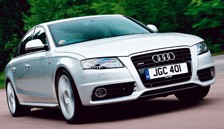Rewind 10 years: for UK fleets, German premium means BMW and Mercedes-Benz. The C-Class and 5 Series are slugging it out for supremacy in both retail and fleet sectors, leaving Audi in their wake.
Back to 2009 and Audi UK head of fleet Iain Carmichael has collected the Fleet News fleet car of the year award for the Audi A4, a category voted for by fleet decision-makers.
A decade of new model launches, new niches and a reinvigorated dealer network has powered Audi into the premium league. For many, it is now the brand of choice.
Audi has also benefited from the move 18 months ago to a Volkswagen Group policy on fleet sales and a sharing of the customer database. Offering something for everyone, the group has leveraged its strength while fleets have enjoyed greater support.
Audi fleet success
Audi is keen to retain its new found popularity among fleets, which has seen it win solus deals with the likes of Thomas Cook, worth 230 cars.
“Fleets are seeing real value in what Audi can offer them as a brand,” Carmichael says. “Our image is still understated – we aren’t seen as brash. And we have the new product to back up the image.”
Residual values have also held up after the factory took urgent steps to curb production.
Consequently, Audi has not suffered surplus stock levels and has returned to waiting times for most models. Fleet market share is running at 6% year-to-date, up from 5.7% last year.
Sales of Q7 and A8 are expected to dip in line with fleet trends for downsizing, but that gap will be filled by the new A5 Sportback due later this year.
And with Audi investing e2 billion (£1.75 billion) a year in product research and development, there will be no let up in the steady stream of new models.

2009 Audi strategy - fleet penetration
Audi’s strategy for this year is to maintain fleet penetration. The sector accounts for almost 70% of sales, of which a third is blue-chip fleets, a quarter small fleets sold via the dealer network and the rest SMEs via leasing companies.
However, to force sales up further would risk the image of the brand. “We would have to act in a different way by being more supportive and that would distress the brand and our values,” says Carmichael.
He believes the sector that has the most potential for growth is small business fleets targeted through the retail network. Each dealership has a local business development manager who manages the fleet relationship and ensures they are treated the same as a retail customer.
“We have largely removed the ‘can’t have a test drive because you won’t be buying from us’ attitude,” Carmichael says. Historically it’s been one of the biggest complaints from fleets.
Next on the agenda is improving loyalty through more regular and timely communication with fleets.
Focus shifts to fuel efficiency
Audi is resisting the temptation to launch a green-specific range. But it recognises the need to push the green agenda due to the pressures from the Government’s taxation policy.
“We don’t see ourselves as doing something particularly green,” Iain Carmichael says. “It’s Vorsprung durch Technik that drives us – that’s what took us into diesel and into FSI petrol and it’s also what is taking us into a new range of fuel efficient Audis.”
‘Fuel efficient Audis’ will be the tagline used in Audi’s summer marketing campaign, which will centre on three ad treatments.
One will be based around the TDIe introduced on the A3 and the A6. An ‘e’ engine will also be added to the A4 this year but it won’t be promoted as a stand alone green brand.
The second will focus on stop-start technology, while the third will promote recuperation.
“In the past we have created interest at the top end of the brand by promoting halos like the R8,” Carmichael says.
“This year our communication is about efficiency.”
















Login to comment
Comments
No comments have been made yet.